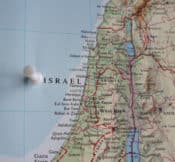Description
OUR STRIDES TOWARD A GENTLER, KINDER WORLD
As we come to the end of the year 2010, newspapers and magazines are offering their summaries of the year’s events. So, consider this final sermon of the year as “The Year in Review – a Jewish Perspective.”
This sermon focuses on key events of 2010 to make the case for the evolving humanitarian nature of mankind.
From the global aid to Haiti to the universal celebration of the Chilean miners rescue, to the different efforts directed at eradicating hunger and disease – we can detect a pattern of revolutionary changes in the world today. Take the recent unprecedented response of Israel’s less-than-friendly neighbors to the disastrous fire which overwhelmed the northern part of the country at the beginning of this month. In ancient history one country’s disaster would have been cause for another’s celebration. What has happened since then?
The sermon traces the evolution of human kindness – from Abraham, through Sinai and its world-transforming laws (such as love your neighbor as yourself), to the spread of these values through American-style freedom and democracy and, finally, to the spreading embrace of human rights throughout the world.
It posits that the most recent events of nations helping each other are signs that the divine spirit within humanity is shining through. As Isaiah prophesied it would.
Still, much remains to be done. And though there are other hopeful signs – such as the “Giving Pledge” taken by 57 world’s billionaires to give away at least half their wealth to charity – each one of us is called upon to do our part. We cannot rest on our laurels, we cannot be complacent in the face of so much hunger, poverty and injustice. We must remember how far we have come – from slavery to freedom – and take courage and strength from our past to act. The time is now.
HOW YOU CAN BECOME A MIRACLE WORKER
At this time of the year, the media are fond of year-end reviews. And so, in newspapers and magazines, or on television and the Internet, we get to revisit some of the more sensational stories of the year: the earthquake in Haiti, the oil spill in the Gulf of Mexico, the rescue of the Chilean miners, the volcanic eruption in Iceland, the floods in Pakistan, the devastating fire that consumed northern Israel.
And as often as not, when we read amazing stories of survival against the odds, the word “miracle” is bound to surface. Do a search for this word in the archives of New York Times, and you will find more than 10,000 instances in the last 30 days alone, and this is not a religious publication by any means.
Since we use this word so much, we must believe in miracles. Or do we?
When we think of actual miracles we automatically think of something supernatural, something biblical, something ancient – like the Ten Plagues about which we read this week in the Book of Exodus. We do not think of miracles as a modern phenomenon. Sure, we use the words “miracle/miraculous” but we just mean “highly unusual” or “unexpected” or “statistically impossible.” But if it is impossible, isn’t it a miracle?
This sermon examines the many types of miracles that occur in our lives and explains how we can be miracle workers ourselves. When we create a bridge between the natural world and the spiritual world, we tap into that miraculous power.
We can work miracles? Yes. In a way, this is true of each one of us. We can reach out and love others and thereby open ourselves up to the channel of energy that allows the physical reality to be changed. How do we become such a channel? Through faith in God and commitment to virtue, and by recognizing that the spiritual reality of love transcends our self-consumed physical one. When we acknowledge that, we open the doors between worlds and then anything is possible.







Reviews
There are no reviews yet.